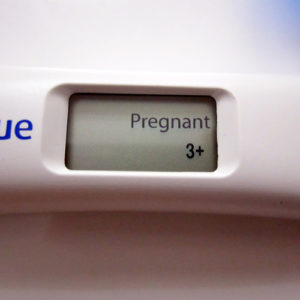If you’re trying to get pregnant, or perhaps you’re already pregnant, you may be wondering if it’s safe to drink alcohol; perhaps a small drink every now and then? Some couples may wish the answer was different, but the facts are clear: there is no safe amount of alcohol to consume during pregnancy. A team of researchers, including experts from the University of Aberdeen, have now concluded that there is no stage of pregnancy that’s safe for alcohol to be consumed.
In the past, specifically during the 1950s and 1960s, it was quite acceptable for pregnant women to not only drink alcohol, but to smoke as well. Some doctors in the 1960s actually prescribed alcohol in order to prevent premature labour. In fact, in some parts of the world it’s still quite common and culturally acceptable for women to indulge in light drinking during pregnancy.
Alcohol Consumption Now Known to Affect Foetal Brain Development
But now, thankfully, we know better! The team of researchers, which included Professor Lin Gao and Professor Celso Grebogi from the ICSMB (Institute for Complex Systems and Mathematical Biology) now fully understand how alcohol consumption by an expectant mother can affect foetal brain development. The findings of this study group have been published in the journal Chaos, explaining how they analysed brain signals using complex network theory, and researched the biological alterations to the brain that drive FASD’s (Foetal Alcohol Spectrum Disorders).
They discovered that the brain connections of teenagers who had been exposed to alcohol consumption whilst in the womb, were altered, consistent with impaired cognitive performance. They reached their findings by using a brain imaging technique known as MEG (magnetoencephalography) to measure responses, then used tools developed using chaos theory to analyse them.
This is the first time ever that researchers have used this method to quantify in detail how exposure to alcohol affects the developing brain.
Foetal Alcohol Spectrum Disorders
What Are FASDs?
FASD refers to lifelong brain and physical disorders that can affect both unborn and new-born babies caused by exposure to alcohol during the mother’s pregnancy. It is now known that FASDs are linked to a number of neurological conditions, including ADHD, and that they are one of the leading causes of intellectual disability, worldwide.
Problems may include short height, small head size, low body weight, abnormal appearance with characteristic facial abnormalities, poor coordination, behavioural problems, low intelligence, and vision and hearing problems.
Depending on the stage of pregnancy, the effects of alcohol will manifest in different ways. Exposure to alcohol during the first trimester can lead to heart defects, characteristic abnormalities in the face, and other abnormalities including kidneys, hearing, eyes, and bone structure. Exposure to alcohol during the second trimester increases the risk of stillbirth and miscarriage; while in the third trimester alcohol exposure can affect brain growth, and length and weight.
Even today, researchers are still unsure how alcohol alters the developing brain. While we now know that the alcohol consumption of expectant mothers is linked to cognitive impairments in children, the precise mechanisms as to how alcohol alters the brain is still just a prevailing theory.
Study Findings
Professor Celso Grebogi stated that the study they carried out, which included brain connectivity and cognition in combination with mathematical modelling, clearly showed there are no safe stages or safe amounts of alcohol that can be consumed during pregnancy. He added that alcohol consumption during pregnancy can result in loss of connectivity in the brain, which may lead to cognitive impairments such as dementia, schizophrenia, and autism.
In the past it’s been difficult to draw conclusions from complex MDG data, which has hampered the study of brain circuitry in affected individuals; so researchers designed an innovative computer technique known as Cortical Spatio-Temporal Multi-Dipole Analysis, which allowed them to identify active areas of the brain when participants were placed in an MEG machine. Data was collected from both FASD patients and volunteers without FASDs, and it was discovered that, among the FASD group, several areas of the brain showed impaired connectivity. Study subjects who had been exposed to alcohol consumption whilst in the womb were much more likely to suffer from problems with connections through the band of brain tissue connecting the two halves of the brain known as the corpus callosum. People who suffer from multiple sclerosis, schizophrenia, depression, autism, and abnormalities in sensation typically report having deficits in this area.
No Safe Stages and No Safe Amounts of Alcohol
Leading author of the paper, Professor Lin Gao, stated that their research provides key evidence that children who were exposed to alcohol in-utero are at greater risk of experiencing impaired cognitive abilities, in addition to other secondary factors. He added that their study proves that there are no safe stages of pregnancy and no safe amounts of alcohol that can be consumed during pregnancy.
Professor Lin Gao hopes that their group’s research will inspire others to conduct their own studies on disorders like FASD that could well benefit from bringing computational and medical fields together.
Non Alcoholic Drinks Is the Way Forward!
Pregnancy is truly a journey that brings about changes and adjustments, in a woman’s life. One such change involves the importance of avoiding alcohol consumption for the well being and safety of both the mother and the baby. While it may initially seem like a challenge to find delightful and invigorating drink options rest assured that there are plenty of alternatives to cater to a pregnant woman’s taste buds. In this article we will explore some nourishing drink substitutes specifically designed for mothers.
Mocktails; Non-alcoholic versions of popular cocktails are becoming more and more popular and easy to find in bars and supermarkets, presenting a wide array of flavours to choose from. Whether you prefer fruity blends like virgin mojitos or daiquiris or creamy options such, as pina coladas there is undoubtedly a mocktail that will suit your preferences perfectly. These delightful concoctions are typically crafted using fruit juices, soda water. Garnished with herbs or fruits delivering a refreshing and gratifying experience without any alcohol involved.
Flavoured Water; Enhancing the taste of water by infusing it with a variety of fruits, veggies and herbs can create a great drinking experience. Just add slices of fruits, like lemon, lime or orange along with crushed mint or basil leaves to a pitcher of water. Let it steep for a couple of hours. The outcome is an hydrating beverage that’s not only good, for you but also pleasurable to drink.
Herbal Infusions; When it comes to pregnancy herbal infusions present an alternative, to alcohol. There is a range of flavours and health benefits to explore such as chamomile, ginger, raspberry leaf or peppermint infusions. These herbal beverages not provide relaxation and soothing effects. Can also alleviate common pregnancy symptoms like nausea, heartburn and difficulty sleeping.
Sparkling Fruit Drinks; If you’re craving some effervescence and sparkle consider opting for sparkling fruit based drinks instead of alcoholic beverages. These drinks are often crafted from fruit combined with mineral water offering a delightful fizziness and an explosion of fruity flavours. Pour it into a glass add ice and a garnish for that celebratory touch.
Smoothies; Fruit and vegetable smoothies can be both nourishing and delicious for expecting mothers. Brimming with vitamins, minerals and fibre content these smoothies are a way to incorporate fruits vegetables along with dairy or plant based milk into your daily routine. Feel free to experiment with combinations, like strawberry banana blend or the tropical twist of mango pineapple; even the classic blueberry spinach mix can be incredibly satisfying. Smoothies offer a convenient way to pack in essential nutrients during pregnancy. Toss in leafy greens like spinach or kale for an added boost of folate, iron, and fibre. Sprinkle in nutrient-rich seeds like chia or flaxseeds for omega-3s that support baby’s brain development. You could even blend in yogurt or milk for calcium and protein. Get creative by mixing vegetables like beets or carrots for extra vitamins and minerals. With smoothies, the flavour combinations are endless – from tropical treats with pineapple and coconut to rich, decadent chocolate-peanut butter delights. A vibrant smoothie can kickstart your morning with energy or provide a refreshing afternoon pick-me-up. The best part? Smoothies are easy to sip on-the-go for busy mums-to-be.
Photo credit; “Red Wine” by Anthony Cunningham for Zoom Baby
Zoom Baby is a leading supplier of Pregnancy Tests and Ovulation Test Kits





